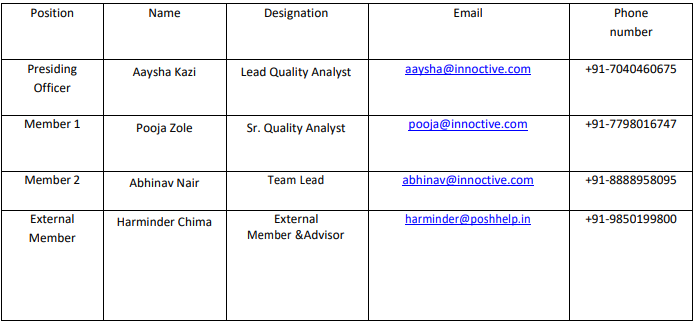Commitment to Safety
POSH POLICY
Abstract
PREAMBLE
The Parliament of India passed the “Sexual Harassment of Women at Workplace(Prevention, Prohibition and Redressal) Act,” in the year 2013.
The guidelines explicitly state the following:
“It shall be the duty of the employer or other responsible persons in workplaces to prevent or deter the acts of sexual harassment and provide the procedures for the resolutions, settlement, or prosecution of acts, of sexual harassment by taking all stepsrequire.” All Organizations having 10 or more employees are bound by the Supreme Court’s directive and the POSH Act, 2013.
Innoctive also committed to create and maintain work environment which is free of all forms of gender violence, sexual harassment, anddiscrimination on the basis of sex/gender.
OBJECTIVE
Innoctive Technologies Pvt Ltd. (“Innoctive”), is committed to create a safe work environment that is free from any form of sexual harassment and where all employeesare treated with dignity and respect. Innoctive is dedicated to maintaining an environment which isfree from coercion and intimidation.
Innoctive has adopted certain procedures and guidelines to govern cases against sexual harassment. The procedure has been provided below in Innoctive’s policy against sexual harassment (“Policy”).
All allegations of sexual harassment shall be taken seriously by Innoctive and shall begoverned by this Policy.
This Policy extends to all employees of Innoctive and is deemed to be incorporated inthe service conditions of all employees and comes into effect immediately.
Innoctive is implementing a Gender-Neutral policy.
DEFINITION
Any behavior (physical, verbal, written, graphic, electronic, emotional, psychological, or through gestures that offend) which has been defined as inappropriate by the Policy, whether intentional or not, which offends the dignity of the person towards whom the behavior is directed by fellow employee(s), supervisor(s), customer(s), or supplier(s) will be considered sexual harassment and shall invite serious disciplinary action.
Sexual harassment would mean and include (whether direct or by implication) any of the following:
- Unwelcome sexual advances Requests or demands for sexual favors, either explicitly or implicitly, in return for employment, promotion, examination, or evaluation of a person towards any activity.
- Advances involving verbal, non-verbal, or physical conduct Includes sexually colored remarks, jokes, letters, phone calls, e-mail, gestures, showing of pornography, lurid stares, physical contact or molestation, stalking, indecent exposure, physical contact, sounds, display of pictures, intrusive questions about a person’s private life or body, signs, insults, or taunts based on sex, obscene communication, verbal or non-verbal communication that offends the individual’s sensibilities and affects her/his performance.
- Eve teasing, innuendos, and taunts Unwelcome invitations to go out, suggestive comments or jokes, physical confinement against one’s will, and likely intrusion upon one’s privacy.
- Act or conduct by a person in authority Creates a hostile or intimidating environment at the workplace towards a person of the opposite sex.
- Conduct of such an act at the workplace or outside In relation to an employee during the course of employment.
- Any unwelcome gesture by an employee having sexual overtones Includes physical contact and advances.
- A demand or request for sexual favors Staring, leering, or unwelcome touching.
- Suggestive comments or jokes Sexually colored remarks; showing pornography.
- Unwelcome sexual activity tied to employment decisions or benefits Any other unwelcome physical, verbal, or non-verbal conduct of a sexual nature.
APPLICABILITY
- All employees of Innoctive (including employees on contract or on third-party rolls).
- All customers, suppliers, and contractors of Innoctive.
- All third parties associated with Innoctive at work or involved in work-related activities.
- The complainant as well as the respondent, who may be a man or a woman.
- The complainant need not be of the opposite sex.
- The respondent can be anyone, including the complainant’s supervisor, agent, contractor, customer, client, or any other employee of Innoctive.
- The complainant does not have to be the person harassed but could be anyone affected by the offensive conduct.
- It may occur without economic injury to the complainant.
- It may occur at the workplace or any other place where the employee is engaged in work-related activities.
- It may occur with Innoctive employees deputed to client sites.
IC FORMATION
Complaints of sexual harassment shall be dealt with by the Internal Committee (IC).
- Annexure 1 of the Policy provides for the constituent members of the IC.
- The IC should comprise a Presiding Officer (compulsorily a woman), and not less than half of its members
should be women. - External member, as mandated by law.
REDRESSAL PROCEDURE AND MECHANISM
- Complaints must be made by the complainant to any IC member within 3 months from the date of the incident. The IC, if reasonable, may further extend the time period for making a complaint to a further 3 months.
- Complaints can be made in person, via phone, email, or letter to the Presiding Officer or any committee member. Any oral communication should be followed up with written communication.
- If an employee is working outside the Innoctive office, i.e., at a client location, they may also lodge a complaint with the committee members.
- In case it is found that any employee has lodged a false complaint, the IC can take action against such a person after the inquiry.
- TEvery employee who threatens or intimidates any person who has made a complaint under this policy or any witness thereof shall be liable for disciplinary actions as per the rules of Innoctive.
LODGING A COMPLAINT
- The complainant needs to submit a detailed complaint, along with any documentary evidence available or names of witnesses, to any committee member at the workplace.
- The complaint must be lodged within 3 months from the date of the incident/last incident. The Committee can extend the timeline by another 3 months for reasons recorded in writing if satisfied that these reasons prevented lodging the complaint.
- If the complaint cannot be made in writing, the Presiding Officer or any IC member shall render all reasonable assistance for making the complaint in writing.
CONCILIATION AND INFORMAL COMPLAINT REDRESSAL PROCEDURE
- The IC shall meet within 3 days of filing the complaint to examine it.
- At the request of the complainant, IC shall settle the matter between the complainant and the respondent/accused through conciliation.
- Conciliation should not include any monetary settlement.
- Upon conciliatory settlement, no further inquiry shall be conducted by the IC.
RELIEF TO COMPLAINANT DURING PENDENCY OF INQUIRY
- Allow the complainant to work from home for up to 3 months.
- Grant leave to the complainant for up to 3 months, over and above the official leave.
- Restrain the respondent from reporting on the work performance or supervising any academic activity or evaluation of the complainant.
FORMAL COMPLAINT REDRESSAL PROCEDURE AND MANNER OF INQUIRY
- Upon receiving a complaint, the IC shall interview both parties within 2 working days and record findings.
- A minimum of 4 IC members, including the Chairperson and an external member, shall be present during the inquiry.
- The IC shall provide a report of its findings to the Organization within 10 days from the completion of the inquiry.
- If the IC concludes that the allegation is true, it shall recommend actions such as deduction from the respondent’s salary to compensate the aggrieved or disciplinary actions as appropriate.
- Disciplinary actions may include a letter of warning, written apology, withholding of promotion, pay rise, increments, or dismissal.
DISCIPLINARY ACTIONS AND COMPENSATION
- Mental trauma, pain, and suffering caused to the aggrieved.
- Loss of career opportunity due to sexual harassment
- Medical expenses incurred for physical or psychiatric treatment.
- Income and financial status of the respondent.
MALICIOUS ALLEGATIONS
If the IC finds that the allegation against the respondent is malicious, it may recommend action against the complainant similar to that for substantiated complaints.
APPEAL
Any dissatisfied party may appeal to the appellate authority within 90 days of the recommendations being communicated.
CONFIDENTIALITY
All involved in the complaint process must maintain confidentiality. Any breach will lead to disciplinary actions as per Innoctive’s rules.
TRAINING AND WORKSHOPS
The IC members shall undergo compulsory training against workplace sexual harassment, covering topics like gender sensitization, procedural intricacies, case studies, and complaint mechanisms.
DUTIES OF THE EMPLOYER
- Provide a safe working environment.
- Display penal consequences of sexual harassment.
- Organize workshops and training programs.
- Provide necessary facilities for dealing with complaints and conducting inquiries.
DUTIES OF THE EMPLOYEE
- Abstain from acts amounting to sexual harassment.
- Report incidents without fear.
DUTIES OF THE IC
- Conduct inquiries as per the procedures outlined.
- Maintain confidentiality and prepare an annual report.
- Ensure fair and unbiased handling of complaints.
PREPARATION OF REPORT
- Number of cases received, disposed of, and pending.
- Workshops and awareness programs conducted.
- Actions taken by the Executive Committee or the employer
EVALUATION OF POLICY
- The Sexual Harassment Policy shall be evaluated so that any amendments required may be recommended by the redressal committee based on their experience of dealing with complaints.
- The exercise shall be an annual exercise at the minimum. The Policy will be flexible to amendments to address situations that the policy has not covered at the onset.
ANNEXURE 1


